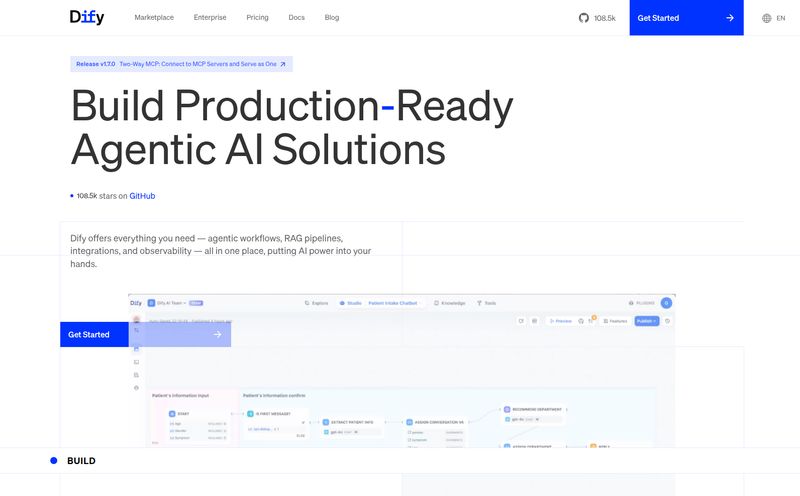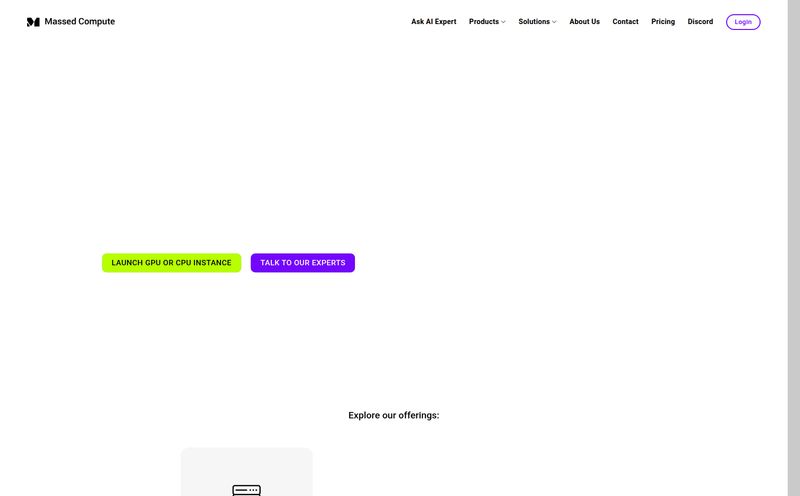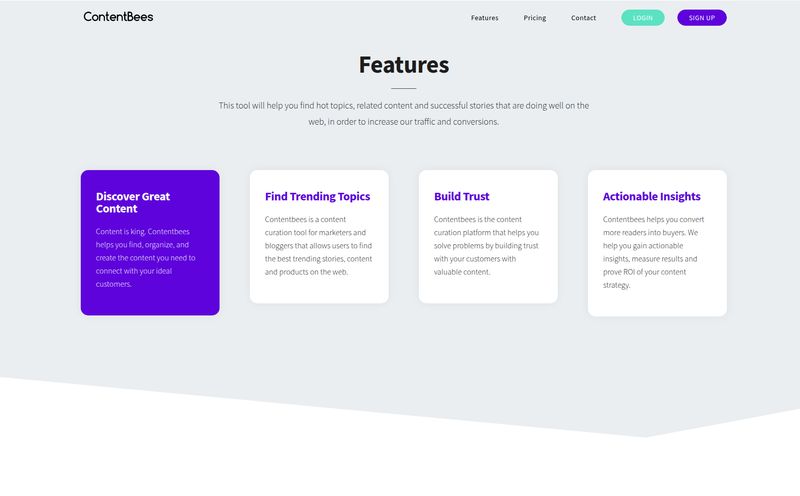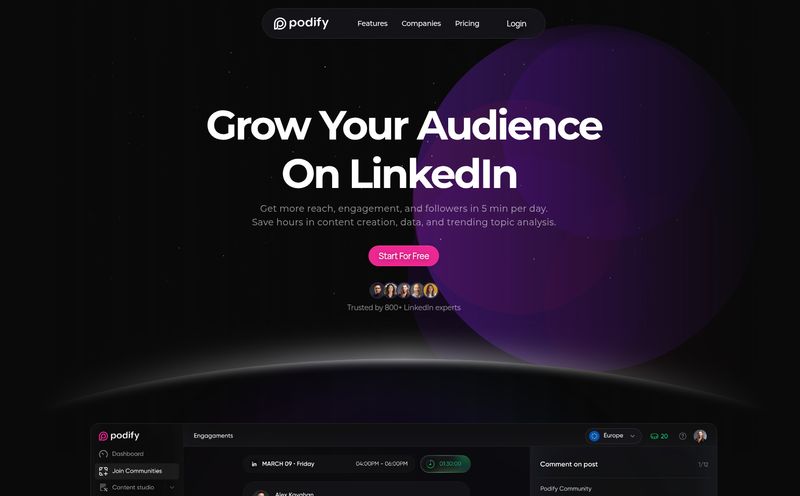Some days, my brain feels like it’s split in two. One minute I'm deep in the weeds, trying to figure out why a piece of code is throwing a tantrum. The next, I’m switching hats, staring at a spreadsheet, and trying to figure out who on this green earth would actually want to buy the thing I just built. It’s the classic tech grind, right? The context-switching can be absolutely brutal.
So, when a tool like Firebender pops up on my radar, I’m immediately intrigued. And a little skeptical. On the surface, it claims to be two things at once: a hyper-intelligent AI assistant for Android Studio developers, and a slick lead generation engine for sales teams. My first thought was, “Okay, pick a lane.” Can one platform really do both of these things well? It sounds a bit like finding out your accountant is also a world-class professional wrestler. Surprising, and you're not sure if it's a good thing. But I had to check it out.
What Exactly Is This Firebender Thing Anyway?
Let's break it down. Firebender is basically a productivity tool powered by the same kind of Large Language Models (LLMs) that fuel things like ChatGPT. But instead of just being a general-purpose chatbot, it focuses its powers on two very specific, and often painful, business tasks.
For developers, it embeds itself into Android Studio, acting as a “Cursor” or a pair programmer that's always on, never needs a coffee break, and can autocomplete code, refactor messy functions, and even take on entire tasks on its own. It's built for the mobile dev world.
For sales teams, it turns the dreaded task of lead generation on its head. Instead of giving you a noisy list of thousands of potential companies, it uses its AI to automatically qualify them, saving you from hours of mind-numbing manual research. It’s about finding the signal in the noise.
It’s an odd-couple pairing, for sure. But the more I think about it, the more it makes a certain kind of sense, especially for smaller teams or freelancers who have to do it all.
For the Devs: Your New AI Pair Programmer in Android Studio
Okay, let's talk about the coding side first, because that’s what their homepage really screams about. As someone who has spent more nights than I’d like to admit staring at a stubborn bug in Android Studio, the promise of an AI that gets it is mighty appealing. GitHub Copilot walked so tools like Firebender could run, and this one seems to be sprinting in the Android lane.
Agent, Composer, and Autocomplete Explained
Firebender breaks its coding assistance into a few key functions. The “Agent” is the big-picture thinker. You can supposedly give it a high-level task, like “refactor this entire module for better performance,” and it will look at your codebase, understand the context, and handle the whole thing. It’s like having a senior dev you can delegate to. Pretty bold claim.
Then you have the more hands-on tools. “Composer” helps you write new chunks of code from scratch, and “Autocomplete” is pretty much what it sounds like—but on steroids. It’s the feature that gives you those lightning-fast suggestions that feel like it’s reading your mind. They claim it can make edits up to 15x faster. While I always take marketing numbers with a grain of salt, even a 2x improvement is a win in my book. And seeing logos like Meta, Google, Adobe, and Patreon in their testimonials lends it some serious street cred. If it's good enough for their engineers, its worth a look for the rest of us.
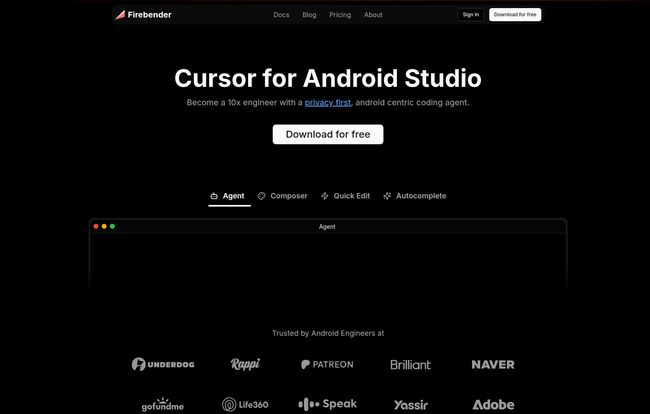
Visit Firebender
For the Hustlers: Cutting Through the Noise of Lead Gen
Now, let's switch gears to the other side of the Firebender brain. Lead generation. Ugh. If you've ever been in sales or had to do your own business development, you know the pain. You get a massive list from a data provider, and you spend the next week sifting through it, trying to find the 1% of leads that are actually a good fit. It’s like panning for gold with a teaspoon.
This is where Firebender’s AI qualification comes in. Instead of just scraping data, it analyzes companies at scale to figure out if they truly match your ideal customer profile. It’s a shift from quantity to quality. It aims to eliminate the hours spent on LinkedIn, reading “About Us” pages and trying to guess if a company is the right fit. For sales teams, that time saved is money earned, directly. It means more time spent talking to genuinely interested prospects and less time chasing ghosts.
Let's Talk Turkey: Firebender's Pricing Tiers
Alright, cool tech is one thing, but what’s the damage to the wallet? This is where every tool shows its true colors. I appreciate that Firebender has a pretty clear pricing structure, including a free tier, which is always a good sign in my book.
Here’s a quick rundown of their plans:
| Plan | Price | Best For |
|---|---|---|
| Hobby | Free | Students, solo devs, or anyone wanting to test the waters. |
| Developer | $30 / month | Professional developers who want to seriously speed up their workflow. |
| Business | $60 / user / month | Development and sales teams needing collaboration features and SSO. |
| Max | $150 / month | Power users and individuals who rely heavily on AI for both coding and lead research. |
| Enterprise | Custom | Large organizations with specific security, support, and usage needs. |
The Hobby plan is your classic freemium model. It gives you a taste with a limited number of AI requests. The Developer plan seems like the sweet spot for most individual coders. But the Business plan is interesting, as it's priced per user and adds team management and security features like SAML/SSO, which is a must-have in any serious corporate environment.
The Good, The Bad, and The AI-Generated
No tool is perfect. So let's get real about what works and what you need to watch out for.
On the plus side, the raw speed and time-saving potential are obvious wins. Automating tedious parts of coding and lead research can free up massive amounts of mental energy for more important, creative work. The dual functionality, while odd, could be a killer feature for a freelancer or a small startup founder wearing multiple hats. And again, that free tier is fantastic for letting people try it out without any risk.
Now for the reality check. Those usage limits on the free and lower-tier plans are real. If you start to rely on it heavily, you’ll likely need to upgrade. More importantly, this is still AI. It's a ridiculously powerful assistant, but it's not infallible. I’ve seen AI tools confidently generate code that is subtly but disastrously wrong. You have to be the human in the loop. You have to review the code. You have to double-check the qualified lead to make sure the AI didn't misunderstand the company's mission. Don't just trust, verify.
My Final Take: Is Firebender Worth Your Time?
So, what’s the verdict? I went in skeptical, but I’m coming out pretty impressed by the ambition.
For an Android developer, I’d say trying the free plan is a no-brainer. If it can genuinely save you even an hour a week, it’s probably worth the cost of the Developer plan. It's a direct shot at the GitHub Copilot throne, but with a specialization that could give it an edge for mobile development.
For a sales team, the value proposition is incredibly clear. It could fundamentally change your prospecting workflow from a manual grind to a semi-automated, high-quality pipeline. The time saved alone could deliver a huge ROI.
But the most interesting use case might be that solo founder or small agency. Someone who codes the product on Monday and sells it on Tuesday. For them, Firebender isn't a two-headed monster; it’s a unified solution for the dual life they live. It’s not a perfect tool, but it's solving real, tangible problems in a very creative way.
Frequently Asked Questions about Firebender
- Does Firebender own the code it generates?
- Nope. Based on their FAQ, you own the code. Whether you're on a free or paid plan, the code generated is yours to use as you see fit. This is a standard and important policy.
- Does Firebender train its AI on my private code?
- This is a big one for privacy, and they’re very clear about it: no. They state that they don't train their models on your code. Your intellectual property remains yours and isn’t used to improve their service for others.
- What happens if I go over my plan's limits?
- Typically, with tools like this, once you hit your monthly request limit (for agent, autocomplete, etc.), the features will either stop working until the next cycle or you'll be prompted to upgrade to a higher tier. The free plan is generous enough to get a feel, but not for heavy daily use.
- Is Firebender better than GitHub Copilot?
- That’s the million-dollar question! I wouldn't say “better,” but “different.” GitHub Copilot is a fantastic general-purpose coding assistant. Firebender's main advantage is its deep integration and specialization for Android Studio. If you live and breathe Android development, that focus might make it a more effective tool for your specific workflow.
- Can the sales lead tool integrate with my CRM?
- While the site doesn't heavily advertise specific CRM integrations like Salesforce or HubSpot, the qualified lead lists generated by the tool can almost certainly be exported as a CSV file. This allows for easy importing into virtually any modern CRM system, so you can fit it into your existing sales process.
Closing Thoughts
Firebender is taking a big swing by trying to serve two very different masters. It’s a bold move that could easily have fallen flat, but from what I've seen, they seem to be pulling it off with a thoughtful and powerful platform. It’s a testament to how targeted AI can be applied to solve some of the most tedious parts of our jobs.
If you're a coder, a seller, or one of the crazy people who does both, I'd say give the free Hobby plan a spin. What do you have to lose, except maybe a few hours of boilerplate coding or bad-fit lead research?
